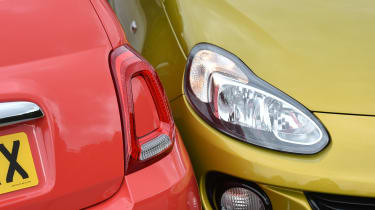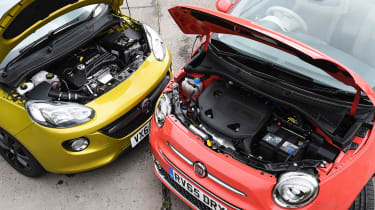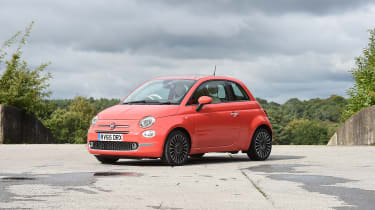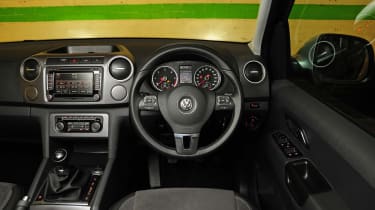Fiat 500 vs Vauxhall Adam
Can a facelift keep the Fiat 500 among the leading lights in the city car class? We find out as it meets the Vauxhall Adam
The Fiat 500 was a saviour for the Italian brand when it came along in 2007, revitalising its model line-up with some much needed chic design.
It captured the essence of the original 500 with its retro styling, but despite being on the market for the best part of a decade, sales figures keep on rising. In fact, 2014 was the modern 500’s best year yet, with Fiat shifting 45,000 cars. So the question is, has the company tried to fix something that wasn’t broken with this facelifted 500?
Tweaks to the car are subtle; the brand hasn’t messed with the winning formula. However, there are enough changes inside and out – including a new infotainment system – to keep the 500 on buyers’ radars.
Yet it now faces plenty of fresher, funky choices on the city car market, like the Vauxhall Adam. So we’ve lined up the compact 500 with Fiat’s city-friendly TwinAir engine against the Adam, powered by a 1.0-litre three-cylinder turbo, for a battle of the fashion-focused urban runabouts. Which is the more trendy, more talented car about town?
Head to head
Customisation
Fiat gets fresh colour schemes and new optional ‘Second Skin’ graphics packs, such as the diamond-style pattern on our test car. But the Adam leads the personalisation race, with a multitude of unusually named styling packs for the interior and exterior, including contrasting colours for the roof, body and wheels, plus the dashboard trim.
Engines
It's two cylinders against three in the engine stakes. Both cars have turbos and deliver similar outputs, but the Vauxhall’s engine is smoother and more refined. This isn’t the be all and end all in a city car, though. The 500’s unit has good punch, which gives the car a unique personality.
Design
Subtle tweaks have kept the Fiat 500 looking fresh next to the newer Adam. It helps that the basic shape has been left unchanged, while new ‘floating’ light design is a crisp detail. It’s just a shame that the revised headlights aren’t so good at night.
Verdict
1. Fiat 500
Poor real-world economy is still the 500 TwinAir’s weak point, but otherwise, this revised car has the measure of the Adam. The Fiat continues to capture the original’s retro charm well, while the updates add a more hi-tech feel inside and improve its road manners. Plus, it’s more practical than the Vauxhall, pretty much matches its performance and holds on to its value better.
2. Vauxhall Adam
This 1.0i turbo version is without question the best Adam yet, thanks to its smooth power delivery and decent efficiency. However, it’s pricier than the more premium-feeling Fiat and depreciates more, too. Its customisation options add some flair, but they don’t come cheap, while the cramped boot and back seats see the Vauxhall finish second here.
Other options for similar money...
New: Smart ForFour Prime - Price: £12,315 Engine: 0.9-litre 3cyl, 89bhp
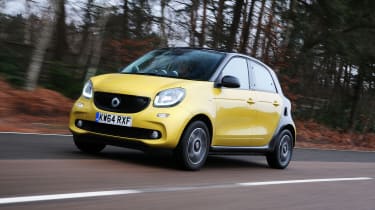
It's down on power, but the four-seat Smart ForFour Prime gets lots of premium features to rival our test cars, like cruise control, heated seats and a panoramic roof. There’s also crosswind assist to improve safety on the motorway.
Used - available now
Used: MINI Cooper - Price: £14,500 Engine: 1.5-litre 3cyl, 134bhp
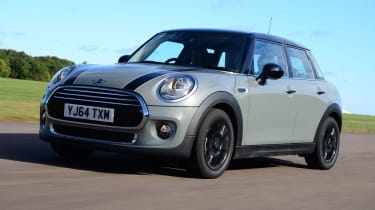
For a similar budget to the Fiat, you could have a nearly new, current-shape MINI Cooper with a more powerful engine and plenty of kit, including DAB, cruise control and Bluetooth. It’s a more premium package, plus you still get the balance of the warranty.
Figures
| Fiat 500 Lounge 0.9 TwinAir 105 | Vauxhall Adam Glam 1.0i | |
| On-the-road price/total as tested | £14,420/£16,340 | £15,000/£16,815 |
| Residual value (after 3yrs/30,000) | £6,250/43.3% | £5,900/39.3% |
| Depreciation | £8,170 | £9,101 |
| Annual tax liability std/higher rate | £402/£804 | £508/£1,016 |
| Annual fuel cost (12k/20k miles) | £2,007/£3,345 | £1,418/£2,363 |
| Ins. group/quote/road tax band/cost | 14/£412/A/£0 | 10/£382/C/£30 |
| Cost of 1st/2nd/3rd service | £399 (3yrs) | £149/£249/£149 |
| Length/wheelbase | 3,571/2,300mm | 3,698/2,311mm |
| Height/width | 1,488/1,627mm | 1,484/1,720mm |
| Engine | 2cyl in-line/875cc | 3cyl in-line/998cc |
| Peak power | 104/5,500 bhp/rpm | 113/5,200 bhp/rpm |
| Peak torque | 145/2,000 Nm/rpm | 170/1,800 Nm/rpm |
| Transmission | 6-spd man/fwd | 6-spd man/fwd |
| Fuel tank capacity/spare wheel | 35 litres/space saver | 38 litres/repair kit |
| Boot capacity (seats up/down) | 185/550 litres | 170/663 litres |
| Kerbweight/payload/towing weight | 940/N/A/800kg | 1,138kg/N/A/N/A |
| Turning circle/drag coefficient | 9.3 metres/N/A | 10.7 metres/N/A |
| Basic warranty (miles)/recovery | 3yrs (60,000)/1yr | 3yrs (60,000)/1yr |
| Service intervals/UK dealers | 18,000 miles/160 | 20,000 miles (1yr)/404 |
| Driver Power manufacturer/dealer pos. | 24th/11th | 30th/19th |
| NCAP: Adult/child/ped./assist/stars | 5/3/2/N/A/N/A (2007) | 87/72/65/81/4 (2013) |
| 0-60/30-70mph | 11.1/11.0 secs | 9.5/8.4 secs |
| 30-50mph in 3rd/4th | 4.4/5.8 secs | 4.4/5.7 secs |
| 50-70mph in 5th/6th | 8.2/11.9 secs | 8.1/11.9 secs |
| Top speed/rpm at 70mph | 117mph/3,000rpm | 121mph/2,750rpm |
| Braking 70-0/60-0/30-0mph | 54.4/39.2/10.2m | 57.8/41.4/11.3m |
| Noise levels outside/idle/30/70mph | 74/53/66/74dB | 73/52/64/73dB |
| Auto Express econ (mpg/mpl)/range | 30.1/6.7/232 miles | 42.6/9.4/356 miles |
| Govt urban/extra-urban/combined | 51.4/80.7/67.3mpg | 47.1/67.3/57.6mpg |
| Govt urban/extra-urban/combined | 11.3/17.8/14.8mpl | 10.4/14.8/12.7mpl |
| Actual/claimed CO2/tax bracket | 251/99g/km/14% | 178/112g/km/17% |
| Airbags/Isofix/park sensors/camera | Seven/yes/yes/no | Six/yes/£275/no |
| Automatic box/stability/cruise control | No/yes/no | No/yes/yes |
| Climate control/leather/heated seats | £270/£780/no | Yes/£900/£215 |
| Metallic paint/xenon lights/keyless go | £460/£610/no | £545/no/no |
| Sat-nav/USB/DAB radio/Bluetooth | £350/yes/£100/yes | No/yes/yes/yes |

